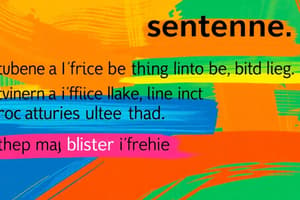Podcast
Questions and Answers
The statement 'At the meeting.' is a complete thought.
The statement 'At the meeting.' is a complete thought.
False (B)
The sentence 'We saw the dog.' forms a complete thought.
The sentence 'We saw the dog.' forms a complete thought.
True (A)
The phrase 'Magazines on the shelf.' is a complete sentence.
The phrase 'Magazines on the shelf.' is a complete sentence.
False (B)
The statement 'They bought a new phone.' is considered a sentence.
The statement 'They bought a new phone.' is considered a sentence.
Signup and view all the answers
The phrase 'That money.' is an example of a sentence.
The phrase 'That money.' is an example of a sentence.
Signup and view all the answers
The main word in the complete subject is called the complete predicate.
The main word in the complete subject is called the complete predicate.
Signup and view all the answers
A compound subject consists of more than one simple subject.
A compound subject consists of more than one simple subject.
Signup and view all the answers
In an imperative sentence, the subject is directly stated.
In an imperative sentence, the subject is directly stated.
Signup and view all the answers
The simple predicate is the main verb in the complete subject.
The simple predicate is the main verb in the complete subject.
Signup and view all the answers
The sentence 'Super Cat and Wonder Dog went to save their friend.' contains a compound subject.
The sentence 'Super Cat and Wonder Dog went to save their friend.' contains a compound subject.
Signup and view all the answers
A compound subject consists of more than one simple subject.
A compound subject consists of more than one simple subject.
Signup and view all the answers
Real images are formed out of people's imagination.
Real images are formed out of people's imagination.
Signup and view all the answers
The simple predicate is the main verb in the complete subject.
The simple predicate is the main verb in the complete subject.
Signup and view all the answers
The sentence 'The giraffe has a long neck.' contains a simple subject.
The sentence 'The giraffe has a long neck.' contains a simple subject.
Signup and view all the answers
Fantasy ideas are proven to be true.
Fantasy ideas are proven to be true.
Signup and view all the answers
Which type of sentence contains only one independent clause?
Which type of sentence contains only one independent clause?
Signup and view all the answers
What distinguishes a compound sentence from a simple sentence?
What distinguishes a compound sentence from a simple sentence?
Signup and view all the answers
Which sentence contains a dependent clause?
Which sentence contains a dependent clause?
Signup and view all the answers
What is true about a dependent clause?
What is true about a dependent clause?
Signup and view all the answers
What type of sentence combines both independent and dependent clauses?
What type of sentence combines both independent and dependent clauses?
Signup and view all the answers
What classification applies to the sentence 'Dennis is a dutiful son who always follows what his parents say.'?
What classification applies to the sentence 'Dennis is a dutiful son who always follows what his parents say.'?
Signup and view all the answers
Select the correct classification for 'We have a group activity today, but I cannot participate because I am sick.'
Select the correct classification for 'We have a group activity today, but I cannot participate because I am sick.'
Signup and view all the answers
Identify the type of sentence represented by 'When the rain stops, we can play in our backyard.'
Identify the type of sentence represented by 'When the rain stops, we can play in our backyard.'
Signup and view all the answers
How is the sentence 'You cannot connect to the online class because you don't have an internet connection.' classified?
How is the sentence 'You cannot connect to the online class because you don't have an internet connection.' classified?
Signup and view all the answers
Which classification fits 'I made a desperate move to catch the vase, but it fell, and I could reach it.'?
Which classification fits 'I made a desperate move to catch the vase, but it fell, and I could reach it.'?
Signup and view all the answers
What defines a complex sentence?
What defines a complex sentence?
Signup and view all the answers
Which of the following statements accurately describes a compound-complex sentence?
Which of the following statements accurately describes a compound-complex sentence?
Signup and view all the answers
Which of the following best describes a simple sentence?
Which of the following best describes a simple sentence?
Signup and view all the answers
What role do subordinating conjunctions play in a sentence?
What role do subordinating conjunctions play in a sentence?
Signup and view all the answers
What is an example of a compound sentence?
What is an example of a compound sentence?
Signup and view all the answers
What punctuation always marks the end of a declarative sentence?
What punctuation always marks the end of a declarative sentence?
Signup and view all the answers
Which sentence type expresses strong feelings?
Which sentence type expresses strong feelings?
Signup and view all the answers
Which of the following is an example of an imperative sentence?
Which of the following is an example of an imperative sentence?
Signup and view all the answers
What is the purpose of an interrogative sentence?
What is the purpose of an interrogative sentence?
Signup and view all the answers
Which of the following sentences is categorized as declarative?
Which of the following sentences is categorized as declarative?
Signup and view all the answers
Study Notes
Understanding Sentences and Fragments
- A sentence conveys a complete thought and typically contains a subject and a predicate.
- A fragment lacks a complete thought; it may be a phrase or clause that does not stand alone as a complete sentence.
Examples of Sentences and Fragments
- Example of a fragment: "At the meeting." This does not convey a full idea.
- Another example of a fragment: "That little girl." It identifies a subject but lacks further information.
- A complete sentence example: "We saw the dog." This presents a full idea with a subject (we) and verb (saw).
- A complete sentence example: "Today we are going to eat ham sandwiches." It contains a subject, verb, and additional detail.
Distinguishing Between Sentences and Fragments
- Fragments can often appear as phrases or incomplete clauses, such as "The hamster and its wheel" or "Magazines on the shelf."
- Complete sentences provide a clear message, as seen in examples like "The book is great" and "We enjoyed the film."
Practice Identifying Sentences and Fragments
- Review the provided list to classify each statement accurately as either a sentence or a fragment.
- Recognize that sentences can express statements, commands, or exclamations, while fragments need additional context to form complete thoughts.
Subject and Predicate
- Complete Subject: Encompasses all words that identify what or who the sentence is about.
- Complete Predicate: Comprises all words that explain what the subject does or is being described.
Simple Subject and Predicate
- Simple Subject: The main word or phrase in the complete subject, identifying who or what the sentence is about.
- Simple Predicate: The main verb or verb phrase that describes the action or state of the subject.
Compound Subjects and Predicates
- Compound Subject: Formed when a sentence has two or more simple subjects connected by a conjunction.
- Example: "My friend and I"
- Compound Predicate: Occurs when a sentence has two or more simple predicates connected by a conjunction.
- Example: "wrote our autobiographies and published them in our blogs."
Imperative Sentences
- In imperative sentences, the subject is often implied rather than stated; the hidden subject is understood to be "you."
- Example: In "Read the story to the children," the subject is "(You)."
Exercise Instructions
- Practice identifying subjects and predicates by drawing a slash mark between the complete subject and complete predicate in given sentences.
- Provides examples to illustrate the task, such as "My sister/ bought her first book at a local bookstore."
Identifying Subjects
- Simple subjects represent the main noun or pronoun in a sentence.
- Compound subjects consist of two or more simple subjects joined by a conjunction.
- Example of a simple subject: "My family"
- Example of a compound subject: "Reading and listening"
Identifying Predicates
- Simple predicates express the action or state of being of the subject.
- Compound predicates involve two or more verbs or verb phrases linked by a conjunction.
- Example of a simple predicate: "is unique"
- Example of a compound predicate: "wake up early and do my morning reading"
Real vs. Nonfact Ideas
- Real ideas and factual images exist in reality, are perceptible by the senses, and are verifiable.
- Nonfact ideas stem from imagination, incorporating elements like magical powers and mythical creatures.
- Both types of images can provide inspiration for storytelling.
Sentence Examples
- For nonfact images: "The mermaid is a mythical creature" demonstrates a simple subject (mermaid) with a nonfact context.
- For real images: "The giraffe has a long neck" features a simple subject (giraffe) based on a factual context.
Kinds of Sentences
-
Simple Sentences: Comprise one independent clause; can have a simple or compound subject and predicate.
- Example: "Miggy was excited on the first day of school."
- Example: "Miggy and Chino greeted and helped their teacher."
-
Compound Sentences: Consist of two independent clauses linked by coordinating conjunctions (for, and, nor, but, or, yet, so) or conjunctive adverbs (therefore, however, moreover, etc.).
- Example: "We are now in grade 6, and everything seems to be different."
- Example: "My cousin didn’t like to go to school, yet he went anyway."
-
Complex Sentences: Include one independent clause and one or more dependent clauses, connected by subordinate conjunctions (because, since, although, etc.).
- Example: "I was so playful that my teacher called my attention."
- Example: "The man was unhappy, though he was very rich."
-
Compound-Complex Sentences: Feature at least two independent clauses and one or more dependent clauses, utilizing both coordinating and subordinate conjunctions.
- Example: "Although he was struggling to get out of bed, Chino went to school anyway so he could be in his favorite class."
- Example: "Although Zoe enjoys anime movies, she tried Korean dramas and enjoyed them."
Clauses
- A clause is a word group that contains both a subject and a verb.
- Independent clauses can function as standalone sentences and provide complete thoughts.
- Dependent clauses require independent clauses to form complete sentences; they cannot stand alone as they are considered sentence fragments.
Sentence Classification
- Simple sentences (S) contain one independent clause and express a complete thought.
- Compound sentences (C) consist of two independent clauses connected by coordinating conjunctions such as "and," "but," or "so."
- Complex sentences (CX) have one independent clause and at least one dependent clause, often introduced by subordinating conjunctions like "because" or "when."
- Compound-complex sentences (CC) contain at least two independent clauses and one or more dependent clauses.
Examples of Sentence Types
- C: "Some students enjoy online learning, but many students still prefer going to school."
- C: "I didn't do my homework, so I'm grounded for one week."
- C: "Shiela wants to sleep, but she just can't."
- CX: "Dennis is a dutiful son who always follows what his parents say."
- CX: "Karen got a discount on her tuition because she is a scholar."
- CX: "The principal announced that the school year would start early."
- S: "In our virtual Art class, we do origami."
- S: "When the rain stops, we can play in our backyard."
- C: "Ronnie likes action movies, but Marlon prefers suspense."
- CC: "We have a group activity today, but I cannot participate because I am sick."
Combining Sentences
- Combining sentences can create different sentence types depending on the structure.
- CX: "You cannot connect to the online class because you don't have an internet connection."
- C: "Lorna was present on Monday, but she was absent on Tuesday."
- S: "My mom will do some shopping and then she'll have lunch afterwards."
- CC: "I made a desperate move to catch the vase, but it fell, and I could reach it."
- CX: "We all cheered when the defense came off the field."
- C: "Cory wanted to buy a new laptop, so she started saving money."
Sentence Structure Types
- Simple Sentence: Contains one independent clause, which has a subject and a verb, expressing a complete thought.
- Compound Sentence: Comprises two or more independent clauses connected by a conjunction or semicolon. Each clause can stand alone as a separate sentence.
- Coordinating Conjunctions: There are seven key conjunctions used to connect independent clauses in compound sentences.
- Complex Sentence: Formed with one independent clause and one dependent clause, the latter introduced by a subordinating conjunction or relative pronoun. Dependent clauses have a subject and verb but do not form a complete thought by themselves.
- Subordinating Conjunctions: These are essential for identifying dependent clauses and include various words that introduce them.
- Compound-Complex Sentence: Contains at least two independent clauses and one or more dependent clauses, combining elements of both complex and compound sentence structures.
- Flexibility in Structure: Dependent clauses may occur before independent clauses in certain sentences, showcasing various arrangements in English sentence structure.
Contributor Information
- Josef Essberger: Founder of EnglishClub.com and author of educational materials for English learners, including "English Prepositions List" and "Learn English in 7."
- Feedback from Learners: Positive testimonials highlight the engaging and informative nature of the resources offered through EnglishClub.
Types of Sentences
- Sentences are categorized into four main types: declarative, imperative, interrogative, and exclamatory.
Declarative Sentences
- These sentences make a statement and are the most commonly used.
- Always end with a period.
- Examples include:
- "I had ice cream at the beach today."
- "Spiderman is playing at the movie theatre this weekend."
- "Cats like to take long naps in warm, cozy spots."
Imperative Sentences
- Imperative sentences give commands or requests.
- They can end with either a period or an exclamation mark.
- Examples include:
- “Once dry, take the clean laundry off the drying rack.”
- “Time to get up for school!”
- “Get out of the pool!”
Interrogative Sentences
- Interrogative sentences ask questions.
- They are designed to elicit information.
- Examples include:
- “How much is this candy bar?”
- “Where are we going this weekend?”
- “When do we leave for our trip?”
Exclamatory Sentences
- These sentences express strong emotions or feelings.
- Always end with an exclamation mark.
- Examples include:
- “Don’t touch the stove!”
- “Stop being so loud!”
- “Hurry up!”
Practice and Worksheets
- Worksheets available for students to practice identifying and using different sentence types.
- Additional materials help students convert sentences from one type to another, such as from declarative to interrogative.
Studying That Suits You
Use AI to generate personalized quizzes and flashcards to suit your learning preferences.
Description
This quiz focuses on the distinction between sentences and fragments, helping you identify complete thoughts versus incomplete phrases. Through various examples, you'll learn to recognize the structure of both sentences and fragments. Test your knowledge and sharpen your writing skills with this essential exercise.




